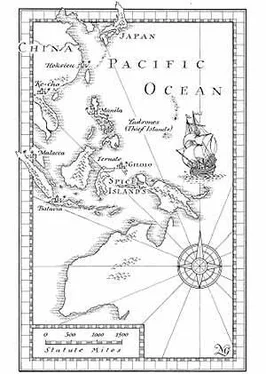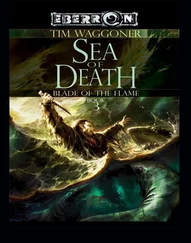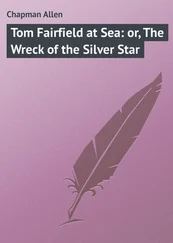He descended the staircase to find Don Alonso waiting in a small side room, where a table had been laid for two people. ‘Ensign Carvalho has already gone to contact the members of the Consulado,’ said the Governor genially. ‘So this evening the two of us will be dining alone. I don’t often have visitors, and never before someone who has sailed around the Cape.’
The meal was excellent, a dish of small, succulent oysters followed by delicious beef, and the easy-going, convivial Governor did most of the talking: Valdivia suffered from being very distant from the seat of government in Lima; there had been difficulties with the local Indian tribe, the Mapuche; early hopes of finding silver and gold had been dashed, but there was ample lumber and a potential trade in cattle; it was his intention to make sure the city flourished . .. and so on.
As the evening progressed, Hector found that he grew more and more drowsy. Partly it was the reassuring sensation of being back on dry land after so many weeks at sea. Partly it was the effect of the local wine. It had a slightly resinous flavour, which the Governor assured him was an acquired taste, even as he refilled their glasses yet again. By the time the dessert was served – a concoction of apricots, quince and whipped cream of which Jacques would have been proud – Hector could barely keep his eyes open. The Governor, noting that his guest was growing sleepy, summoned a house servant to escort the young man safely to his room. Hector climbed the stairs, undressed and fell gratefully into bed.

HE AWOKE with a start. His head was aching from the wine, and his eyelids were gummed together. From the angle of sunlight flooding in through the narrow window, he judged it was nearly midday. He rose and found his borrowed clothes where he had dropped them. His own shirt and breeches were missing, and he supposed that they had been taken away for washing. A tray of food had been placed on a table near the door, and he gratefully ate the bread and fresh fruit. A pleasant surprise was the small jug of chocolate. The fact that the drink was barely warm told him how badly he had overslept. He washed and dressed and went to the door.
He was surprised to find it locked. Crossing the room, he leaned out of the window. Below was the courtyard where the Governor had interviewed him the previous afternoon. But there was no one about. Puzzled, he went back to the door and tried it again. It did not budge. Thinking that whoever had brought the tray of food had locked it by mistake on leaving, he banged on the door with his fist and called out, hoping to attract someone’s attention. There was no response. He returned to the window and tried shouting out of it. The only result was that one of the Governor’s large, rangy dogs loped around a corner and gazed up at his window. Then the creature turned and padded away, ignoring him. Hector sat down on the bed to decide on his course of action.
The door was solidly constructed from a dark, heavy timber. The hinges were of forged iron and opened inwards. He couldn’t see how he’d be able either to force the door open or smash through the panels. He checked the window. It was possible to squeeze through, but then he’d be faced with a thirty-foot drop to the flagstones of the yard. There was no handhold, or even a bush to break his fall. He was still sufficiently uncertain of his situation not to want to be found lying in the courtyard with a twisted ankle.
The wisest course was simply to wait and see what happened. He stretched out on the bed and stared at the ceiling.
After a while he thought he heard movement. Someone came quietly to the door and stood outside. He lay still and quiet. A moment or two later he heard the person tiptoe away, then the creak of the stairs. The silence returned.
It was well into the afternoon when he finally heard firm steps approaching the door. There was the rattle of a key in the lock and, when the door swung open, Hector was on his feet, ready to face whoever was there. In the doorway were the same two uniformed soldiers who had escorted him the previous day.
‘What’s happening?’ he asked, both puzzled and angry.
‘Come with us,’ was the flat answer.
Flanked by the two guards, he was taken down the stairs to the entrance hall and along a passageway to large double doors, which opened into what was clearly a council chamber. At its centre stood a long, well-polished table flanked by a score of chairs with ornately carved backs. The whitewashed walls were hung with formal portraits, including one of the Spanish king. In one corner of the room was an altar surmounted by a large crucifix.
But the sight that held his immediate attention was the figure of Jezreel. His friend stood next to one of the tall windows, the light falling full on him. His wrists were bound in front of him, his shirt was ripped so that it hung off his back and there was a blood-stained bandage around his neck. The enormous ex-prizefighter regarded Hector with an expression of both relief and exasperation.
‘Jezreel!’ Hector burst out.
‘Ambushed,’ grunted Jezreel. He had a badly swollen right eye, and his lip was cut.
‘Your friend is extremely difficult to subdue,’ murmured Don Alonso. Hector swung round to find the Governor standing quietly to one side of the room. ‘The intention was to capture your ship, Señor Lynch. But we failed.’
The Governor’s manner was as friendly and gracious as he’d been at dinner the previous evening. By contrast his nephew, standing beside him, looked less at ease.
‘You said you were willing to trade,’ said Hector heatedly.
The Governor allowed himself an apologetic smile. ‘Impossible, I’m afraid. The Viceroy’s edict is quite clear on that subject.’
‘Then why ask me to write to Captain Swan?’
Don Alonso made a slight dismissive gesture. ‘The note proved to be unnecessary. In the event, Luis here was able to attract a boat ashore from Captain Swan’s ship by wearing your clothes and standing where he could be seen.’
‘It fooled me,’ growled Jezreel. ‘I thought it was you and volunteered for the launch to get you. They jumped us the moment we set foot on the beach.’
‘But for the bravery of your friend here, the ambush would have succeeded,’ confessed the Governor. ‘He held us off long enough for the rest of his party to get away in their boat. My men claim they shot and wounded several of the pirates as they fled.’
Hector’s thoughts were in turmoil. ‘But the Cygnet is a genuine merchant ship. You could have refused to trade and merely turned her away. There was no need to attack.’
The Governor shook his head sadly. ‘Señor Lynch, I was dealing with pirates.’
‘You have no proof of that.’ Hector was despondent.
‘I had all the proof I needed from the moment you asked for the Alcalde.’
Hector didn’t understand. ‘Don Fernando de Costana?’
‘Señor Lynch, you underrate the machinery and intelligence of our government. In Valdivia we may be at the farthest end of the viceroyalty, but everyone knows of the Alcalde and how his wife was kidnapped at sea. We have been told to be on our guard, to keep watch for the culprits. Little is known of them, but for the man who acted as their interpreter when negotiating the ransom. He is described as being about twenty years old, with dark hair, eyes possibly hazel or light brown, courteous and well educated, and speaking excellent Castilian with a slight trace of a Galician accent. You should be flattered.’
Hector felt light-headed and foolish. He was dismayed that his past had been uncovered with such apparent ease.
‘What’s happened to the Cygnet ?’ he asked.
Читать дальше









